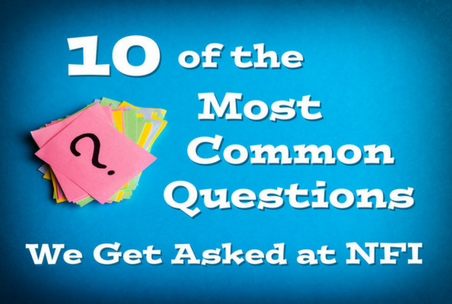10 of the Most Common Questions We Get Asked at NFI – Part 2
3 min read
Date Published: 03/22/2018
Last Updated: 03/22/2018
National Fatherhood Initiative Blog / Latest Articles
3 min read

Hopefully you had a chance to read last week’s blog with the first 5 of 10 of the Most Common Questions We Get Asked at National Fatherhood Initiative (NFI). If you didn’t, be sure to jump over there to check it out.
In this post, I’ll cover the remaining 5. There are certainly more than 10 popular questions we get, but these are the most helpful for everyone!
6. How can I help moms understand that dad is important in his kids' lives?
This is a big one. Staff often witnesses much discord between moms and dads, which ultimately affects how mom views dad, and whether she will allow him access to their children, particularly if she has custody. Staff have trouble determining how to address these challenges and needed resources to help them address them.
We heard this need loud and clear and developed a collection of resources for moms to help them better communicate with dad, co-parent with dad, and work together for the benefit of their children.
Those resources and programs are:
7. What do you mean by a "father-absent home"?
That term is based on how the U.S. Census Bureau defines such a home. It refers to homes in which a biological, step, or adoptive father doesn’t live. It doesn’t include homes absent such a dad or situations in which a non-resident, biological father is involved in his child's life.
It's very important to keep these population-based statistics separate from the circumstances of individual families. There are many single moms who do a great job raising their children, and they do so in some cases with non-resident, biological dads who don’t live in the home or with father figures who do live in the home.
Nevertheless, the research from a population-based perspective is quite clear about the risks to children of negative outcomes when they grow up in a father-absent home and, conversely, the benefits children receive when they live with their dad. But that doesn't mean that the negative outcomes will come to fruition for every child who doesn't live with their dad or that every child who lives with their dad will receive the benefits.
8. How can I get dads to come to our fatherhood program/class?
I could go on and on (and on!) in response to this question. Suffice it to say that it’s such a popular question that we’re working on producing an entire section on our website about recruitment and retention for fatherhood programs. Stay tuned!
In the meantime, I will point you to one extremely helpful free resource: Recruitment Ideas from the Texas Fatherhood Summit. It contains at least 200 recruitment ideas.
Recruiting dads to fatherhood programs take dedication and work. There is no magic bullet. But we know for a fact that there are many programs having great success with recruiting fathers. So, don’t give up!
9. What is your top selling brochure and tip card?
We have several. How ‘top’ is top? I joke.
Our top selling brochure (and the one we’re probably the most known for) has historically been ‘10 Ways to Be a Better Dad’. However, when we produced our newest brochure ‘The Importance of an Involved Father’ it has given ’10 Ways’ a run for its money!
When it comes to tip cards, our top sellers are ‘10 Ways to Be a Better Dad’ and ‘10 Tips for New Dads’.
Our 8-panel brochures offer plenty of space for more details and context, while tip cards are quicker to the point with less content.
10. Are you the government or funded by the government?
The short answer: no.
As I like to say, we're the little non-profit with the big name! NFI is an private, nonpartisan non-profit (501c3) that pre-dates most government-run and government-funded fatherhood programs and initiatives. You see an infographic of our history here.
In fact, we helped many state governments launch their inaugural fatherhood programs in the 1990s, most of which continue to serve fathers in their communities today. Our interaction with government agencies primarily involves helping the organizations they fund in a variety of areas (e.g. child welfare and home visiting) to be more effective in engaging dads in their programs and services. We also help government agencies create strategic and tactical plans around father engagement. NFI is, therefore, considered a “capacity building organization”, meaning, we build the capacity of other organizations who do serve dads directly rather than serve dads ourselves. You can learn more about how NFI transforms organizations and communities here.
Did this answer some of your questions?
What questions do you have for NFI? Email me if you have some. We're always happy to dialogue about fatherhood and NFI.
Didn't get a chance to read part 1 of this series? No problem, just click here.
Date Published: 03/22/2018
Last Updated: 03/22/2018
Download this free guide for a proven 7-step roadmap—from making the case and securing funding for your program, to launching and measuring real results!


Train Your Staff
Fatherhood Programs
Fatherhood Data
© 2026 National Fatherhood Initiative®. All rights reserved.